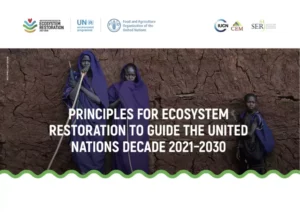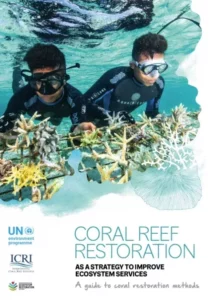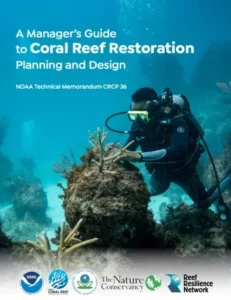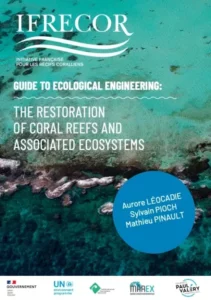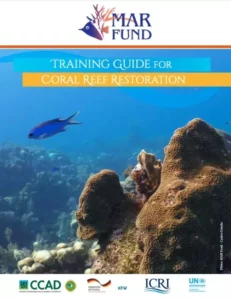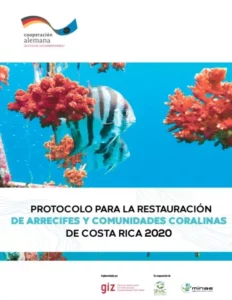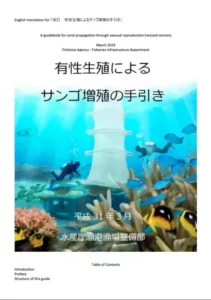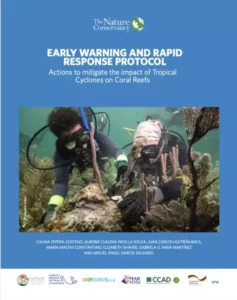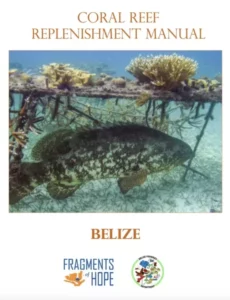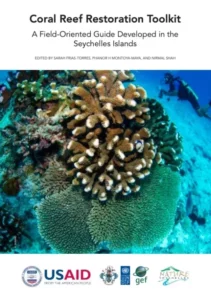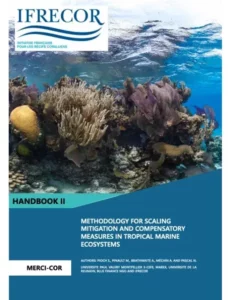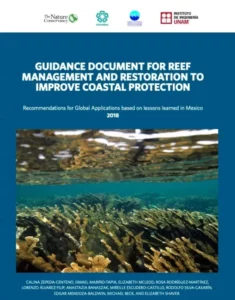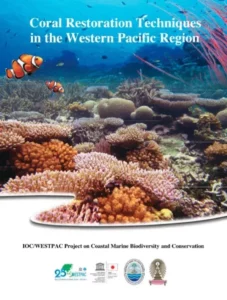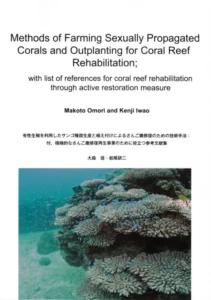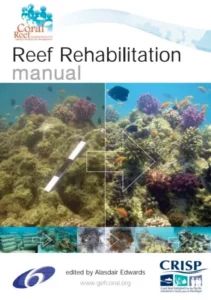Restoration activities are becoming more and more popular across the world, in an attempt to restore/sustain the function and services associated with coral reef ecosystems. It should be noted that these efforts are unlikely to be effective as a stand-alone action, they should always be done as part of a larger integrated management strategy.
Below we have compiled some of the most recent guidelines on coral reef restoration. Should you know of any additional guidelines that are relevant please send them to Thomas Dallison.
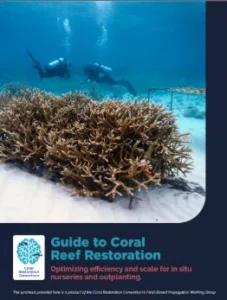
Guide to Coral Reef Restoration: Optimizing efficiency and scale for in situ nurseries and outplanting (2025).
Developed by the Coral Restoration Consortium’s (CRC) Field-based Propagation Working Group — a team of dedicated practitioners who worked together from 2018 to 2023.
This guide brings together the most relevant, widely used methods and lessons learned from years of hands-on experience around the globe. Whether you’re just starting out or looking to scale up your coral restoration program, this guide is designed to support success across diverse goals, environments, and resource levels.
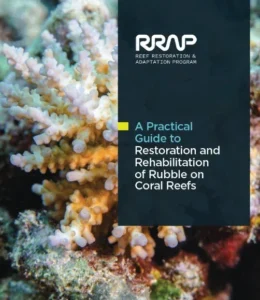
A Practical Guide to Restoration and Rehabilitation of Rubble on Coral Reefs: guidelines from the Rubble Stabilisation Subprogram, summarising recommendations for rubble rehabilitation (2024).
The RRAP Rubble Stabilisation R&D Subprogram is investigating methods to stabilise damaged reef surfaces where dead or degraded corals have become loose and unconsolidated rubble, preventing or slowing reef recovery.
Natural and man-made disturbances (for example, cyclones, ship groundings, crown-of-thorns starfish outbreaks or coral bleaching) can reduce functional and diverse coral reefs to fields of rubble, with an unstable and mobile surface. The lack of stability and frequent motion inhibits recruitment (settlement and regrowth) of young corals back onto reefs and hampers recovery.
Rubble stabilisation, as a reef restoration technique, is in its infancy.
It is also important to be able to identify coral reefs that can most benefit from restoration strategies: those most vulnerable to rubble formation, and those where prevailing wave regimes can make mobile rubble persist and hinder recovery.
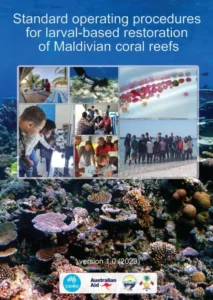
Standard operating procedures for larval-based restoration of Maldivian coral reefs (2023)
The Standard Operating Procedure (SOP) for larval-based restoration has been developed in collaboration between CSIRO and the Maldives Marine Research Institute (MMRI). to provide a practical guide for the use of larval-based restoration in the Maldives. The SOP is separated into four main sections: 1) Before coral spawning, 2) During coral spawning, 3) After coral spawning, 4) Deploying coral larvae. While the report focuses on case studies in the Maldives, it is broadly applicable to larval-based restoration across the Indo-Pacific region.
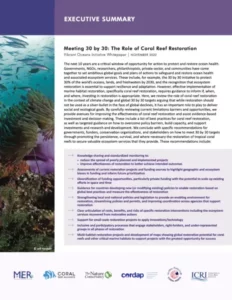
Meeting 30 by 30: The Role of Coral Reef Restoration (2022)
The whitepaper reviews the role of coral reef restoration in the context of climate change and global 30 by 30 targets arguing that while restoration is not the only response to global declines, it has an important role to play to deliver social and ecological goals. The whitepaper also reviews current limitations, barriers, and opportunities, and provides avenues for improving the effectiveness of coral reef restoration and assist evidence-based investment and decision making.
Principles for ecosystem restoration to guide the United Nations Decade 2021–2030 (2022)
To support the implementation of the UN Decade on Ecosystem Restoration and help achieve its goals, there is a need for a shared vision of ecosystem restoration. A key step in creating a shared vision of ecosystem restoration is to adopt principles that underpin the full set of ecosystem restoration activities. These principles detail the essential tenets of ecosystem restoration that should be followed to maximize net gain for biodiversity, ecosystem health and integrity, and human health and well-being across all biomes, sectors and regions.
Although not directly pertaining to reef restoration, these principles for a shared vision of ecosystem restoration are still highly relevant for managers and implementers.
Available in Arabic, Chinese, English, French, Spanish.
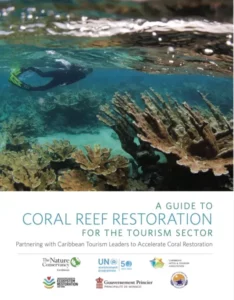
A guide to coral reef restoration for the tourism sector (2022)
These guidelines provide an overview of the tourism sector’s engagement with coral reef conservation efforts in the Caribbean region, including results of the public opinion research, considerations before implementing a coral reef restoration project, and guiding principles and best practices for the tourism sector to implement coral reef protection and restoration efforts more effectively.
Translating the ten golden rules of reforestation for coral reef restoration (2022)
A new study has aimed to translate the ten golden rules of reforestation for coral reef restoration. It seeks to apply lessons from restoring terrestrial ecosystems to coral reefs.
Coral reef restoration as a strategy to improve ecosystem services (2020)
This document presents an overview of the best- available knowledge in the field and provides realistic recommendations for the use of restoration as a management strategy for coral reefs to assist managers, practitioners, policy makers, and funding agencies to make informed decisions. Whilst not designed to reduce climate impacts, coral reef restoration can be a useful tool to support resilience, especially at local scales where coral recruitment is limited, and disturbances can be mitigated. Ongoing investment in coral reef restoration research and development globally will improve the scale and cost-efficiency of the methods currently applied. You can read the policy brief here.
Watch the webinar from the Reef Resilience Network about the guide here.
Managers Guide for coral restoration (2020)
The Manager’s Guide to Coral Reef Restoration Planning and Design supports the needs of reef managers seeking to begin restoration or assess their current restoration program. Based on global best practices, the Guide was developed for reef managers and practitioners, and anyone who plans, implements, and monitors reef restoration activities. Together with a suite of tools and templates, the Guide maps out a six-step, iterative process to help users gather relevant data, ask critical questions, and have important conversations about restoration in their location, culminating in the creation of a Restoration Action Plan to enhance reef resilience and recovery. Within the guide are two Appendices and other tools that can (and should) be used to assist readers in developing a restoration action plan;
- Workbook (.doc) – helps document the process, information, and decisions made during Steps 1-4 of the planning cycle.
- Action Plan Template (.doc) – can be used to shape a Restoration Action Plan using information summarized when completing the Workbook.
- Step 2 Tutorial and Complete Example (.xlsx) – presents a worked example of how to compile, sort, and analyse data to assist in selecting sites for restoration.
- Step 3 Intervention Criteria Evaluation Tool (.xlsx) – helps evaluate and then select restoration intervention options.
- Workbook Supplement (2022) (.pdf) – provides a template to document the information used and decisions made during planning to create a Restoration Action Plan.
Watch the webinar from the Reef Resilience Network about the guide here.
Coral reef restoration monitoring guide: Methods to evaluate restoration success from local to ecosystem scales (2020)
The Coral reef restoration monitoring guide: Methods to evaluate restoration success from local to ecosystem scales. This guide will help any restoration group or government – large or small – decide on a monitoring regimen that fits their budget and capacity. The guide took more than two years to put together – and we are sure this will be a crucial resource to the community as more and more countries engage in coral restoration.
Guide to ecological engineering: the restoration of coral reefs and associated ecosystems (2020)
This guide provides an inventory of ecological engineering techniques employed mainly in France, but also worldwide. It is devoted to the restoration of coral reefs and their associated ecosystems: seagrasses and mangroves. It was produced by the French Coral Reef Initiative (IFRECOR) in French and has recently been translated into English by UNEP.
Training Guide for Coral Reef Restoration (2020)
This Guide is a practical, complementary tool for coral reef restoration training. Any individuals wishing to start a restoration project must contact local authorities to learn about the legal implications and obtain the corresponding permits, as well as join working groups with restoration experience to receive proper training. It was produced the Mesoamerican Reef Fund (MAR Fund), Mesoamerican Reef Rescue Initiative (RRI) with the support of ICRI and the UN Environment Programme Small Grants Program.
Protocol for the restoration of reefs and coral communities in Costa Rica (2020)
This technical document is aimed to support officials of the National System of Conservation Areas (SINAC), non-governmental non-profit organisations (NGOs) related to the sea, academic centres, diving centres and in general, including any person who loves the ocean and is an enthusiast of coral ecosystems and their conservation.
A guidebook for coral propagation through asexual reproduction- revised version (2019)
The English translation of the Japanese coral restoration guidelines. These guidelines provide an overview of the characteristics, functions, and current state of corals in Japan, coral propagation plans and how to go about it. In chapter two it details whole-area propagation techniques for corals and the different methods that could be utilised.
Note: all the text was translated by James Cook University from the Japanese publication of “A guidebook for coral propagation through asexual reproduction- revised version” produced by the Fisheries Agency, the Ministry of Agriculture, Forestry and Fisheries of Japan on their web site (https://www.jfa.maff.go.jp/j/
Early Warning and Rapid Response Protocol (2019)
The Early Warning and Rapid Response Protocol: Actions to mitigate the Impact of Tropical Cyclones on Coral Reefs presents a step wise approach to guide First Responders and reef managers in terms of what needs to be done before, during and after a tropical cyclone to mitigate the impacts to coral reefs in an orderly and timely manner. It is also available in Spanish here.
Belize Coral Reef Replenishment Manual (2018)
This manual was designed to be used by fisherfolk, licensed tour guides, those involved inMPAs in Belize either for the government or an NGO, students and community members. It presents coral restoration methods that have been working successfully in southern Belize since 2006.
Coral Reef Restoration Toolkit: A Field-Oriented Guide Developed in the Seychelles Islands (2018)
Produced by Nature Seychelles in 2018, the purpose of this Toolkit is to describe how to complete a coral reef restoration project, using the ‘coral gardening’ concept and aims to be a companion for scientists, managers, practitioners and local communities who are facing a coral reef restoration challenge and require guidance using low cost, field-tested methods.
Methodology for scaling mitigation and compensatory measures in tropical marine ecosystems (2018)
The French Coral Reef Initiative (IFRECOR) has developed MERCI-Cor a method to assess the significance of an ecological impact, to ensure better avoidance and reduction of ecological losses in the mitigation hierarchy, and sizing compensatory measures, to offset last residual losses.
Guidance document for reef management and restoration to improve coastal protection (2018)
This guidance document aims to provide a review and recommendations on reef management and restoration for risk reduction. It synthesizes evidence of the role coral reefs play in coastal protection and the reduction of risks during disasters. It presents ecological, geological, and oceanographic factors that contribute to the coastal protection capacity of reefs and the factors that reduce this capacity. It also presents an array of risk reduction solutions to restore reef protection services, and management approaches that can help support its coastal protection values.
Practical guide to restoration based on the production of coral sexual recruits with an emphasis on Acropora palmata (2018)
This is a practical guide (in Spanish) that provides information on the production and use of coral sex recruits for reef restoration. This guide is aimed at people interested and/or involved in reef restoration and brings together a compilation of experiences acquired over ten years by the team under Dr Anastazia T. Banaszak at the Academic Unit of Reef Systems of the Institute of Marine Sciences and Limnology, of the National Autonomous University of Mexico.
Coral Restoration Techniques in the Western Pacific Region (2014)
The guide was produced by the Indian Ocean Commission Western Pacific (IOC/WESTPAC) project on Coastal Marine Biodiversity and Conservation with the aim of consolidating techniques that are used and available for coral restoration in the Western Pacific Region.
Methods of farming sexually propagated corals and outplanting for coral reef rehabilitation (2014)
The English translation of the Japanese document on farming sexually propagated corals and how to outplant these corals. The document provides detailed step by step instruction on how to get from the spawning of corals all the way to outplanting of the new corals.
Caribbean Acropora Restoration Guide: Best Practices for Propagation and Population Enhancement (2011)
This Practitioner’s Guide was developed out of a workshop held at the University of Miami Rosenstiel School of Marine and Atmospheric Science (RSMAS) in April 2011. The purpose of this guide is to share the collective knowledge of a community of scientists and restoration practitioners who have been working both independently and collaboratively to restore populations of Acropora corals throughout the Caribbean.
Reef rehabilitation manual (2010)
This Reef Rehabilitation Manual is intended to complement the Reef Restoration Concepts & Guidelines and provide more detailed hands-on advice, based on lessons learnt from previous experience, on how to carry out coral reef rehabilitation in a responsible and cost-effective manner.

